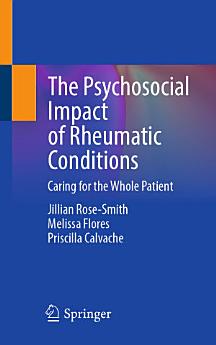The Psychosocial Impact of Rheumatic Conditions: Caring for the Whole Patient
About this ebook
This book serves as s a tool for the entire interdisciplinary rheumatology health care team. This comprehensive approach is framed within the context of well-documented health disparities in rheumatology with a focus on psycho, social, emotional and environmental aspects of health that contribute to patient quality of life. It explores the needs of special populations and provide opportunities for clinicians to consider how to treat diverse populations in a more inclusive way. At the center of this book is the patient’s voice utilizing patient stories to provide the reader with real life examples that reflect the life cycle of rheumatology patients and the impact of key interventions or lack thereof that can impact the patient experience. Lastly, the book offers practical, evidence-based strategies for members of the rheumatology health care team. These tools can be integrated in their assessment and treatment plans for patients and their loved ones. This holistic approach can help to foster effective communication, build trust, enhance partnerships and amplify the patient voice to optimize health outcomes and enhance overall well-being.
About the author
Jillian A. Rose, PhD, MPH, LCSW serves as the Vice President and Chief Health Equity Officer at the Hospital for Special Surgery (HSS), a premier institution dedicated to advancing musculoskeletal health. In this pivotal role, Dr. Rose is an integral member of the HSS leadership team, where she spearheads the development and execution of a comprehensive health equity strategy. Her work focuses on promoting a whole health approach addressing physical, behavioral, and social needs aligned with HSS's mission to ensure access for all patients and reduce variances in care, particularly for those with musculoskeletal conditions.
A passionate advocate for health equity, Dr. Rose has been at the forefront of initiatives aimed at collecting comprehensive demographic data in the electronic medical record. Her leadership extends to guiding quality initiatives that aim to identify and reduce health disparities, ensuring the development of tools and evaluation processes to foster continuous improvement. Dr. Rose also provides operational leadership for HSS’s largest Ambulatory Care Center and the Department of Social Work Programs. Since 2005, Dr. Rose has overseen nationally recognized peer support and psycho-education programs for individuals with lupus and their families, ensuring culturally tailored interventions.
Melissa Flores, MPH, LCSW is the Assistant Director of the Office of Health Equity at the Hospital for Special Surgery (HSS). Ms. Flores works alongside the Chief Health Equity Officer to lead the HSS Health Equity Strategic Plan with a goal of achieving equitable care for all patients. She has spearheaded initiatives to collect, analyze and intervene on health equity-related data, such as social determinants of health (SDOH), leading the implementation of SDOH collection across pediatric outpatient and adult inpatient settings. With over a decade of experience, she works cross-departmentally to identify and address variances in care specific to orthopedic and rheumatology. As a leader of the hospital-wide LGBTQIA+ Committee, she plays a key role in achieving the hospital’s LGBTQ+ Healthcare Equality Leader designation. Prior to this role, Ms. Flores was Social Work Coordinator of the Charla de Lupus (Lupus Chat)® Program, a national bilingual program offering people with lupus and their families peer health support and education. Holding dual Master’s degrees in Social Work and Public Health from Columbia University, Ms. Flores is driven by a deep commitment to centering humanity in healthcare and building trust across communities.
Priscilla Calvache, LCSW, is the Director of the Department of Social Work Programs at the Hospital for Special Surgery (HSS). In her role, she leads a dedicated team focused on supporting and enhancing the quality of life for individuals with rheumatologic and orthopedic conditions, and their families. The department’s innovative national support and education programs are designed to provide essential resources and reduce barriers to access, particularly within culturally diverse communities. Since 2015, Mrs. Calvache has played a pivotal role in managing Rheumatology programs at HSS, specializing in national peer support and education initiatives for individuals living with systemic lupus and their loved ones. Her leadership extends to the HSS Community Health Needs Assessment and the development of the Community Service Plan, which aims to enhance disease self-management and reduce health disparities. Mrs. Calvache also spearheads national training initiatives, with a particular emphasis on the peer health model and the distinctive Lupus Support and Education Programs she oversees, which have an international reach. Mrs. Calvache earned her Master of Social Work degree from Columbia University.








